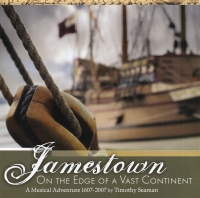|
Album Liner Notes 1. A New World Overture (Virginia the Beautiful) (Dvorak/©Seaman/trad. Afr.-Am.): In competition with the Spanish for a foothold in the West, James I approved the Virginia Company to invest in settlement in Virginia --- a task that barely succeeded at first and turned out to involve the encounter of three continents’ cultures: the English, the Native Americans, and Africans. 2. I Saw Three Ships (trad. Eng.): Although the original song spoke of ships coming into the Thames harbor, we here refer to the Susan Constant, the Godspeed, and the Discovery leaving the Thames in December 1606 and crossing to America. (Many jaw harps were unearthed in the Jamestown Rediscovery excavations.)/East Virginia (trad. Eng.-Am.): Upon arrival, there was great marveling at the bounty and mystery of the land. 3. Kemp's Jigg (trad. Eng.): an English theatre incidental piece/Johnny Todd (trad. Eng.): a sailor song/The Girl I Left Behind Me (trad. Eng.): an old Morris street dance brought to America/ Turmut Hoein' (trad. Eng.): a Westcountry song about turnip farming, a topic of great interest during the survival times in Jamestown/Nonesuch (trad. Eng.): John Smith founded a short-lived satellite settlement far upstream in 1609 named Nonesuch. 4. In Powhatan's Realm (©Seaman): Picture the active young men of the Powhatan’s town Werowocomoco, hunting, fishing, dancing. 5. First Landing at Cape Henry (©Seaman): At dawn on April 26, 1607 land was sighted from the ships; upon landing, the men planted a cross and gave thanks to God. (A passacaglia in form, based on the letters “Timotheus.”) 6. Now Is the Month of Maying (Morley): May 13, 1607 was the arrival time at the Island, in the spring of the year. This tune setting is by Philip Rosseter, 1609. 7. Fair Meadows and Goodly Tall Trees (Fingal's Cave) (trad. Scot.): George Percy so described the land at Cape Henry, beautiful but devoid of the desired silver and gold. 8. Raising James Fort (Brian Boru's March) (trad. Ire.): Early on, the need for palisades called for diligent work. 9. Sir John Smith His Almayne: The prominent composer John Dowland wrote this popular piece for a different Smith but a contemporary of the great adventurer. 10. Swing Low, Sweet Chariot/Balm in Gilead (trad.): Two spirituals from the tradition of the African Americans, first arrived in 1619, who faced the sad plight of bondage on the developing plantations; the themes are healing on earth and release through death. 11. Scarborough Fair (trad. Eng.): A striking popular song of the time. 12. Never Weather-Beaten Sail More Willing Bent to Shore (1612): The noted writer Thomas Campion sings, “Ever-blooming are the joys of heaven’s high paradise.” 13. Greensleeves to a Ground (trad.): A much-played version of the Elizabethan song, taken from the 17th-Century book Division for the Flute. 14. Seaman/Newport (trad.): two early American folk hymns with good tune names! “When through the torn sail the wild tempest is streaming…we fly to our Maker: Save, Lord, or we perish!” Captain Christopher Newport, a privateer commander, was the original leader commissioned by the Virginia Company, and was highly regarded by Powhatan as the English “father”. (The first verse is from the “fa-so-la” shape-note harmonies.) 15. Doxologies: Old Hundredth/Tallis Canon (Bourgeois’ Genevan Psalter, 1551/Tallis): Both are commonly sung worship tunes of the time; the first says in one 17th Century version, “Give thanks to him, bless ye his name because Jehovah he is good: his mercy ever is the same: his truth throughout all ages stood.” 16. Exploring the Rivers (©Seaman): John Smith spent a great deal of time in a shallop or a barge mapping the rivers of the Chesapeake Bay and trading with the Indians for desperately needed food. 17. Pocahontas Remembers (©Seaman): On the sea bound for England, the young wife thinks back on her childhood and on her new life as Rebecca Rolfe. (The melody is based on the letters of another of her names, Matoaka.) 18. The Water Is Wide (Waly, Waly) (trad. Scot.): As with Pocahontas, an entire ocean lay between the new Americans and their native home./Deep River (trad. Afr.-Am.): The spiritual “I want to cross over into campground,” with triple levels of meaning: historical (Joshua crossing the Jordan), spiritual (crossing through death to Heaven or through hardship to blessing), and literal (crossing a river to freedom). 19. Remember, O Thou Man: Thomas Ravenscroft’s Christmas carol says, “The angels all did sing…peace to man living with a good will.” A special tribute to those of the three cultures who indeed dwelt in the land with a good will. |
| MAIN | SONG LIST | LINER NOTES | BUY MUSIC |




 Jamestown: On the Edge of a Vast Continent (2006)
Jamestown: On the Edge of a Vast Continent (2006)